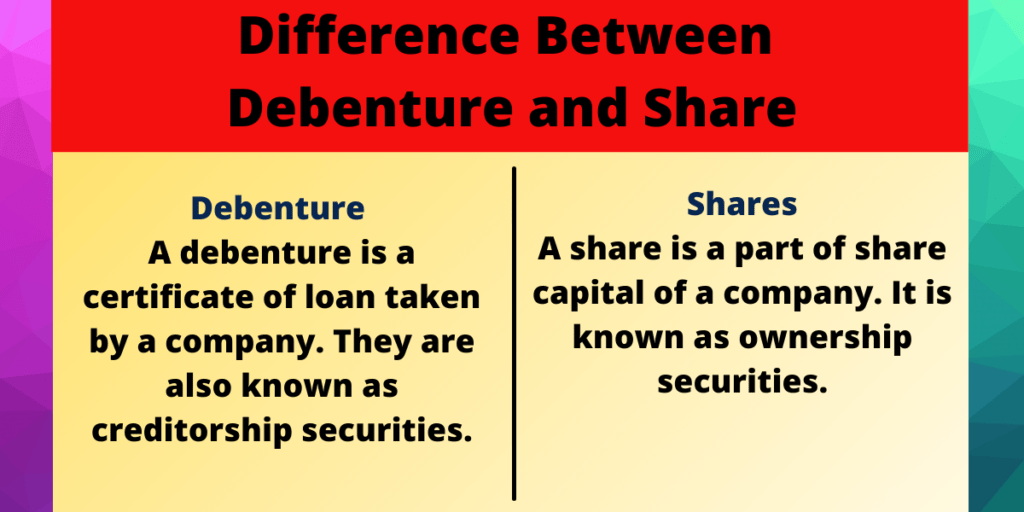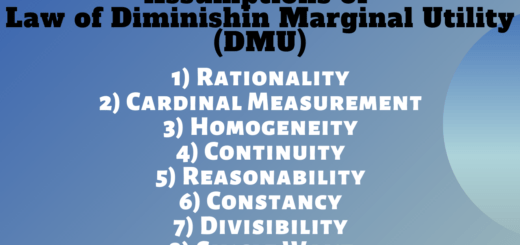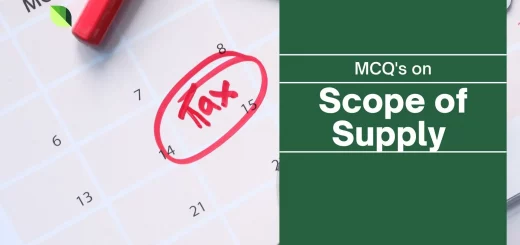Difference Between Debenture and Share (Companies Act 2013)
Table of Contents
Difference Between Debenture and Share (Companies Act 2013)
Share
Meaning of Share:
The term share is defined b Section 2 (84) of the Companies Act 2013, ‘Share means a share in the share capital of a company and includes stock’.
A share is a unit by which the share capital is divided. The total capital of the company is divided into small parts and each part is called share and the value of each part/unit is known as face value. A share is a small unit of the capital of a company. It facilitates the public to subscribe to the capital in smaller amounts.
A person can purchase any number of shares as he wishes. A person who purchases shares of a company is known as a shareholder or a member of that company.

Debenture
Meaning of Debenture:
Debentures are one of the principal sources of raising borrowed capital to meet long and medium-term financial needs. Over the years debentures have occupied a significant position in the financial structure of the companies.
The term debenture has come from the Latin word ‘debere’ which means to ‘owe’.
The term debenture has not been defined clearly under the Companies Act.
Sec 2(30) of the Companies Act 2013, only states that ‘the word debenture includes debenture stock, bonds and another instrument of a company evidencing a debt, whether constituting a charge on the assets of the company or not.
Under the existing definition, debenture includes debenture stock. Debenture means a document that either creates or acknowledges debt. Ordinarily, debenture constitutes a charge on some property of the company, but there may be a debenture without such charge.
- Difference Between Fixed Capital and Working Capital
- Difference Between Owned Capital and Borrowed Capital
- Difference Between Debenture and Share
- Difference Between Preference Shares and Equity Shares
Difference Between Debenture and Share
| Points | Shares | Debenture |
| 1) Meaning | A share is a part of share capital of a company. It is known as ownership securities. | A debenture is a certificate of loan taken by a company. They are also known as creditorship securities. |
| 2) Status | A holder of shares is the owner of the company. Therefore share capital is owned capital. | A holder of debenture is a creditor of the company. Debenture capital is loan capital or borrowed capital. |
| 3) Nature | It is permanent capital. It is not repaid during the lifetime of the company. | It is temporary capital. Generally it is repaid after a specific period. |
| 4) Voting right | Shareholders being owners enjoy normal voting rights in general meeting. They participate in the management of the company. | Debentureholders being creditors, do not have any voting rights. They can not participate in the management of the company. |
| 5) Return on Investment | Return on shares is called dividend. Equity shareholders receive divided at fluctuating rate whereas preference shareholders receive divided at fixed rate. | Return on debenture is called interest. It is fixed at the time of issue. Interest is paid even when company has no profit. |
| 6) Security | Share capital is unsecured capital. No security is offered to the shareholder. | Debenture capital being loan capital is secured by creating a charge on Company’s property. |
| 7) Time of Issue | Shares are issued in the initial stages of the company formation. | Debentures are issued at a later stage, when the company has properties to offer as security. |
| 8) Suitability | Shares are suitable for long term finance. | Debentures are suitable for medium-term finance. |


